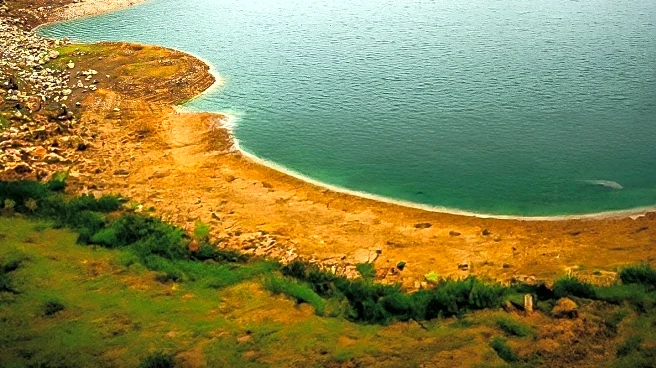What's Happening?
Jersey Water is urging island residents to reduce their water usage as reservoir levels have significantly decreased due to prolonged dry weather. The island's total water storage has dropped to 57% of
capacity, a decline of 5% in the past two weeks, equivalent to 117 million liters. In response, Jersey Water has restarted its desalination plant to help boost water supplies. The utility is encouraging residents to make small changes, such as shortening showers, to avoid the need for water restrictions. Jersey Water operates six main reservoirs, which can collectively store about 2.7 billion liters of untreated water, sufficient to supply the island for approximately 120 days under normal conditions.
Why It's Important?
The call for water conservation is crucial as the island faces a potential water shortage due to lower-than-average rainfall. With rainfall 30% lower than last year and 20% below the five-year average, the situation highlights the vulnerability of water resources in the face of climate variability. The measures suggested by Jersey Water, such as reducing shower times and fixing leaks, are aimed at preventing the imposition of water restrictions, which could impact daily life and economic activities on the island. The situation underscores the importance of sustainable water management practices and the need for public cooperation in resource conservation efforts.
What's Next?
Jersey Water has invited residents to participate in 'Water Night,' an event encouraging the turning off of taps between 17:00 and 22:00 BST to further conserve water. Landmarks such as Fort Regent and Mont Orgueil Castle will be lit in blue to mark the event. Continued public cooperation in water-saving measures will be essential to maintaining adequate water supplies without resorting to restrictions. The utility will likely continue monitoring reservoir levels and weather patterns closely to determine if further actions are necessary.
Beyond the Headlines
The current water conservation efforts in Jersey highlight broader environmental and sustainability challenges faced by island communities. The reliance on desalination plants as a backup underscores the need for diversified water sources and infrastructure investments to enhance resilience against climate-induced water scarcity. This situation may prompt discussions on long-term water management strategies and the role of technology in ensuring sustainable water supplies.









